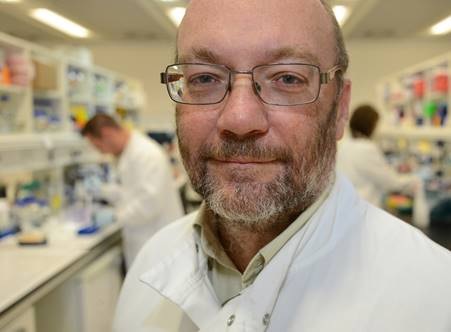My Lab Unlocked: Professor Bruce Whitelaw FRSB

Professor Bruce Whitelaw FRSB on realising the possibilities of genetic editing in livestock and wildlife
6th Feb 2022
My lab aims to develop meaningful applications of genetic engineering technologies. Our overriding focus is on farmed animals – in particular sheep, pigs and cattle – but we have recently started to consider how genetic engineering technologies could have application in wildlife.
Our first transgenic sheep were produced in the 1980s - I have been exploring how genetic engineering technologies could benefit farm animal breeding for some time. Back then, we used pronuclear injection to deliver the transgene, a robust but inefficient method. To increase efficiency we turned to replication-defective viral vectors, and although these proved very efficient – they lack integration specificity and had limited ‘cargo’ capacity.
With the development of genome editing tools, we now have a method that is efficient and precise – and some of our research projects have for the first time moved from the lab into the commercial sector.
Doing genetic engineering research and working with animals is exciting. It also, I believe, offers huge opportunities at a time when we see great challenges to our way of life. Climate change, carbon zero targets, food security, one health – now, more than ever, we need societal dialogue and debate across the wealth of stakeholder communities who could benefit from genetic technologies. How we all navigate through this dialogue will be key to unlocking the right technology applications.
Producing genetically engineered livestock is not simple. My lab needs expertise not just in a range of molecular genetic methods but also access to animal embryology and farm facilities. The Roslin Institute has these facilities and great staff working within them. It is truly a team effort which enables my research to happen, and I cannot thank all my colleagues enough for their many contributions.
I am proud of some of our achievements. Although many years ago, I was part of the research team that produced transgenic animals which produced human biomedical proteins in their milk. This application has seen several proteins enter into the clinic. More recently, my lab in partnership with colleagues at Roslin and Genus Plc have produced genome edited pigs that are resistant to a virus.
The virus is called Porcine Reproductive and Respiratory Virus (PRRSV) and there is neither effective treatment nor vaccines for preventing this virus, which causes distress and death to a huge number of animals every year. A PRRSV outbreak can also be devastating economically to the farmer and can put them out of business. Our commercial partner is now seeking regulatory approval for such pigs. These examples illustrate both a key driver for my research and one of the most rewarding aspects – I want the research we pioneer in the lab to lead to real-life applications and benefit to our society.
Research is not an activity you can do alone. The ability to collaborate with colleagues at Roslin, across the University of Edinburgh, in different parts of the UK and internationally is a must – and is hugely rewarding. Through collaboration, my research has been greatly enriched and I have made life-long friendships. Yes, most are with researchers who excel in their genetic skills but research needs multidisciplinary activity and my collaborations have included those with deep social science, data-handling, ethical and welfare expertise. Although most of my research interactions are with fellow academics, I do count media contacts, commercial colleagues and NGO community amongst my collaboration network. Diversity is a strength.
Scientific research is both exciting and challenging. You act like a detective, piecing bits of information together to come up with a testable hypothesis, a vision of what is possible. Then you put in place the experiments which will prove, or not, your idea. You have to do this while running a lab. This involves regular interaction with your lab team. The Covid pandemic has made this difficult.
I am hugely proud of how my team and colleagues have all worked together while enduring the pandemic to ensure our research activity has successfully continued. There is much talk about a ‘new norm’ after Covid which for some will include ‘hybrid working’. Although it is difficult to know exactly what this will mean going forward, I am very confident that lab research activity will prevail. Specifically for my lab, we are already well into a series of new projects focussed on innovative applications of genetically engineered animals, looking to produce ruminants better able to cope with heat stress and develop gene drive approaches for pest control.
My research is the result of a truly wonderful team effort. I would like to thank the many who have and those who are contributing to this effort, but will suffice in highlighting my great colleague Dr Simon Lillico – his intense logic and sound thinking being a great foil to my over enthusiasm. I am also grateful that my research has been deemed worthy of the support of many funders over the years, and particularly want to acknowledge the primary role the BBSRC has provided in supporting my farm animal genetic engineering research.
Professor Bruce Whitelaw FRSB is Deputy Director and Director of Partnerships at The Roslin Institute and Professor of Animal Biotechnology at the Royal (Dick) School of Veterinary Studies, University of Edinburgh.


